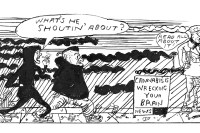How will Lbour fight the next election? Stupidly, it seems. According to a briefing paper obtained by the Guardian, Labour “has decided to attack the Conservatives at the next election as an unreconstructed, dangerous rightwing party that is only masking its true instincts behind slick positioning.” Oh dear. Labour argue that:
I have no idea what the final sentence means, but many people must look at this “analysis” and sigh, “If only that were true…” But it isn’t which, from an electoral point of view, suits the Tories fine. Has the party really changed? By which I mean, has it paid its penance for the mistakes of the Major years? Yes. Not to the extent that those errors have been entirely forgotten – though Cameron’s decontamination project has been remarkably successful – but sufficiently for the public to consider the Tories the lesser of two evils now that the Labour brand has become deathly toxic itself.
How can one measure these things? Well, fluff like this story in Tatler helps show the way in which the wind is blowing. And yes, it’s PR nonsense – but meaningful PR nonsense nonetheless. Five women, a Sikh, a black chap and another with family in the West Indies. This is not, even at the PR level, your daddy’s Tory party.
Labour seem to think they can destroy the Tories. Well, they probably have to if they’re to have any hope of avoiding humiliation: but these are the tactics of a party that’s run out of ideas or ambition. It’s the tired tactics of a tired party that can no longer answer the question what are we about?
As if to underline this, consider that it was the Tories who ran an advertising campaign with the terrible slogan: New Labour, New Danger. Now the Labour party seems determined to make just the same mistake. On the one hand they’re claiming that the Tories haven’t really changed – though the public thinks they have, just as the public was smart enough to realise Blair was not a Kinnock or a Foot or even a Smith – on the other they’re acknolwedging that there is something new about the Tories. You cannae have it both ways Gordon.
The best Brown can hope for is to make this a replay of 1992. Then another unelected PM, new to the job, defied the pundits and won a surprising endorsement from the electorate. Of course, in the long run this proved a good defeat for Labour and a rotten victory for the Tories. And in the unlikely event Labour do scrape a victory next time around, it will prove every bit as poisonous to Brown as winning did to Major. But it’s also unlikely: Major was a fresh fce who, to the public at least, exhibited a rather old fashioned, very English, brand of petit-bourgeois decency. People liked him, found him nice, even if they couldn’t quite understand why. Only later did they start to see this decency as weakness. Brown, by contrast, has been at the heart of government for more than a decade. The voters know what to think of him. They have delivered their verdict: guilty.
Labour say that the Tories are “opposed to strong, active government” which is only sort of half-true at th ebest of times. The public, however, is more likely to point out that mere competence would represent a hefty change from the nonentities and numpties currently mismanaging affairs. In the end, unless the opposition is unusually loopy (hello, 1983!) elections are won and lost on the government’s record. It’s not a good sign when the party in power is reduced to running a witlessly negative campaign. Not a good sign for that party, of course, rather different for the rest of us.






Comments